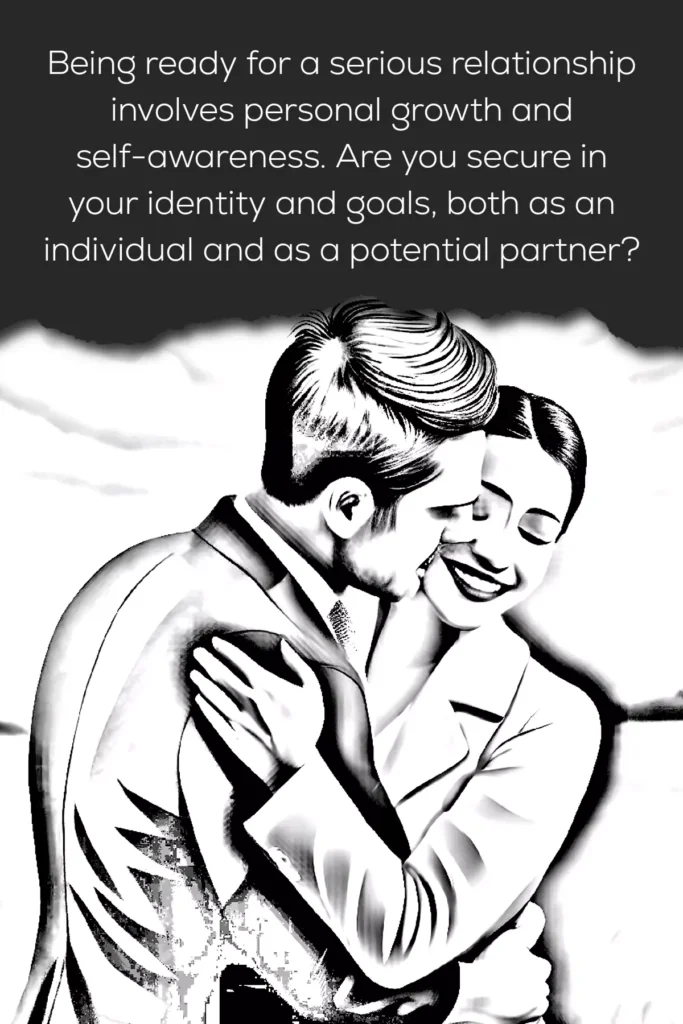Discover 22 ways to know if you’re ready for a serious relationship?
This blog post may contain affiliate links. If we find a product or service to be useful, we encourage you to visit the website via that link. If you make a purchase through our referral link, we may receive a commission. Rest assured, you will not be charged any additional fees. By using these links, you can support us while making your purchase. For more information visit here.
Understanding the Meaning of Serious Relationships
Serious relationships carry significant weight and reflect the emotional commitment between two people. Two people show emotional commitment in serious relationships. They know it takes a significant investment of time, effort, and vulnerability. Before embarking on such a journey, they test their own readiness.
The importance of self-evaluation
Self-reflection tells you if something is signaling to you—yes, now is the time—that you’re primed for a serious relationship. When you evaluate various aspects of your life, emotions, and desires, you conclude whether the relationship you are about to build has a solid foundation or not.
The ultimate guide: How Do You Know If You’re Ready For A Serious Relationship?
When considering a variety of factors—one’s own self, feelings—it can help to figure out if they are ready for a serious relationship. It entails considering personal development, emotional control abilities, and communication skills to gain an understanding of each other, thus creating common ground between both parties involved.
Knowing your goals, values, and what’s important individually and for all is usually a sign that says everything—you’re ready for a committed relationship.
Other important traits include being willing to put in the effort and work for the relationship, being okay with commitment, and having the capacity to trust.
Having friends and family who support you, as well as being able to handle challenges well, helps you start a healthy and committed relationship. Let’s start with the topic: “How do you know if you are ready for a serious relationship?”

I. Assessing the emotional readiness
A critical step in figuring out whether you’re ready for a serious relationship is glancing at your emotional readiness. It entails reflecting on how stable your emotions are, as well as how well you can deal with and share your feelings—how well you deal with stress, how you feel, and when you keep your mental health in check.
1. Assess your emotional stability.
Stability on an emotional level is what makes a relationship last. Take a look at your mental health and figure out what might need some work. To improve mental stability, you need to build strength and learn how to deal with the problems that come up in a committed relationship.
a. Identify and address emotional baggage
Unresolved mental issues from the past can make it harder to get along with others in the future. Recognize and get over past hurts or fears so you don’t bring them into new interactions. If you can’t identify these on your own, seek skilled support to help you heal and grow as a person.
b. Address any pain or fears from the past:
If you want to be ready for a serious relationship, address any traumas or fears from the past by going to treatment, thinking about yourself, and setting healthy limits. Getting these problems solved will make it easier for you to feel emotionally connected to each other in the future.
2. Identify your emotional availability.
To build a strong relationship with a partner, you need to be mentally open to them. Check to see how ready you are to be open and vulnerable. Look at how you’re feeling right now, and think about any mental walls or fears that are stopping you from making a genuine connection. If you are honest with yourself, you can have more real interactions.
Being honest and open are important parts of any close relationship. Think about how well you can talk to a person about your feelings, needs, and wants—think about how well you can communicate and understand how your partner feels.
II. Analyzing Relationship History
It’s important to look closely at your past relationships to see if you are ready for a serious relationship. Consider the past successes and failures, as well as the lessons you learned from them. Think about how you deal with problems, work with others, and settle conflicts. Thinking about yourself might help you learn more about how you’ve grown, what you still lack, and whether you’re ready for a more serious relationship.
3. Reflect on your past relationships.
Your old relationships can teach you a lot, e.g., how you should act and behave now. Take some time to think about these events and what they have taught you. Consider the positive outcomes and the errors that occurred.
a. Do not repeat mistakes.
Making mistakes is a way to learn and grow. You’ll avoid making the same mistakes in future relationships if you are aware of and learn from your past ones. Note down any bad habits or patterns that keep coming up that have led to the end of previous relationships.
b. Identifying patterns or behaviors that persist in relationships.
Relationships often have patterns that show you what you need to work on. Consider your past relationships, your behavior, and your actions before embarking on a major gig to identify any patterns that require correction.
4. Evaluate the reasons for past relationship failures.
Relationship mistakes teach you a lot about how you contributed to the issues. Take responsibility for any bad things you’ve done and work to grow as a person. Resolving these issues will make it easier for people to meet again.
a. Recognize how you play a part in relationship problems.
Self-reflection and change are necessary for relationships to work. Figure out what you did wrong in the past and what you can do better going forward—being aware of yourself will help you build a healthy balance.
b. Fix mistakes you’ve made in the past.
What we believe has a direct impact on what we perceive happening to us, so do something to fix the mistakes you’ve made in the past and form good relationship habits. You can go to therapy, read self-help books, or use relationship tools. Getting better lays the groundwork for better relationships in the future.

III. Establishing Life Priorities and Goals
Listen, before you jump into anything super serious, it’s good to take a step back and think about what you actually want. (Like your dreams, your career goals, and the kind of life you see yourself living.) Grab a coffee and do some soul-searching!
The thing is, you’ve got to figure out if your goals and the guy’s (or girl’s!) goals actually mesh. Do you both crave adventure, or are you a total homebody?
Are you on the same page about having kids someday?
It becomes easier to determine if you’re both walking down the same road when you can clearly see where each of you is heading. It’s like checking a map—you’ve got to make sure you’re on the same route to reach your destination together!
5. Determine your personal life goals.
Before you dive headfirst into a serious relationship, have you taken a break to figure out what you actually want? Engage in self-discovery and self-fulfillment to develop a strong sense of identity and purpose, whether your short- and long-term goals align with your personal values and desires.
You’re about to embark on a big adventure, but before packing your bags, figure out these two aspects.
a. Self-discovery and fulfillment
What are you passionate about, or where do you see yourself in five or ten years? Dream big and explore all those crazy ideas—the more you understand yourself, the easier it is to find someone who complements you rather than completes you.
b. Map out your own personal adventure.
Think of your goals as a treasure map, which means creating a roadmap—what do you want to achieve in life, big or small? Maybe travel is your hobby, or maybe you dream of starting your own business. (Note down those goals, then figure out how to get there and achieve them.)
For a serious relationship, it’s important to chase your own dreams. Make sure your goals and your partner’s goals line up. May you be good at supporting each other and have a lasting trip together!
6. Consider the impact of a serious relationship on your goals.
Entering a serious relationship requires careful consideration of how it aligns with your personal goals and how a partner’s goals and aspirations may complement or conflict with your own. (Open communication regarding life plans and expectations is key to establishing a solid foundation for the future.)
a. Balancing personal goals with relationship commitments
Don’t just swipe right—swipe for someone who’s on the same path! Balancing personal ambitions and relationship commitments is essential for a cordial partnership. Talk to potential partners about what their long-term goals are. Someone who will follow your dreams—or, at the very least, be your biggest cheerleader—is the key to a happy relationship.
b. Evaluating compatibility with a potential partner’s goals
Before committing to a serious relationship, assess how compatible your goals and aspirations are with those of your partner. Discuss potential plans openly, explore shared visions, and evaluate whether they need adjustments to create a trip together.
Some of the bad things about being in a committed relationship are giving up your freedom, letting go of your own goals, resolving conflicts, and having to make an emotional commitment. This can make you feel anxious and open to harm.
IV. Evaluating financial preparedness
Identifying your suitability for a committed relationship requires taking a financial readiness assessment—financial security, ability to stick to a budget, and long-term financial objectives. Think about how at ease you are having frank and collaborative financial discussions with a partner.
Building a solid foundation in a committed relationship requires that both parties be clear about their financial obligations and expectations.
7. Assess your financial stability.
Before getting seriously involved with someone, make sure you can afford them. Are you aware of your financial situation—there are no secrets about it—and do you willingly disclose everything, from your income to your savings and debts? A relationship is safer and more fair when, at least, you are financially sound.
a. Understand your own cash situation.
Inspect your present cash situation—your investments, debts, income, and costs. This will give you a clear picture of your financial situation—you can make a smart choice about whether now is the right time.
b. Achieving financial independence before entering a serious relationship
Being financially independent gives you a sense of protection and freedom. Make sure you can take care of your own needs and share the costs of paying for things. Being able to handle your own money makes for a fair relationship.
8. Discuss financial expectations with a potential partner.
To lay the groundwork for a committed relationship, communicate openly about money with a spouse—conversation about your financial views, aspirations, and expectations. Financial value alignment promotes compatibility by reducing the likelihood of future conflicts.
a. Stressing the need for honest dialogue on money
A sound basis for addressing money is transparency and open communication. Discuss your debt, spending patterns, and future financial aspirations candidly, because fostering an atmosphere of trust enhances the connection between spouses.
b. Evaluating congruence with monetary principles and objectives.
Make sure your financial ideals and aspirations are in line with those of your partner before committing to a long-term relationship, and it’s true vice versa—like spending patterns, attitudes toward saving, and goals for the future of one’s finances. When these principles are in sync, it sets the stage for a financially stable future as a couple.
V. Self-Sufficiency and Interdependence
Inspect the connection between interdependence and self-sufficiency to figure out if you’re ready for a serious relationship. Evaluate your ability to maintain your autonomy while being receptive to potential life partners. Imagine how natural it is for you to depend on other people, and for them to rely on you.
A solid and supportive relationship depends on how we keep a balance between these factors.

9. Become self-sufficient emotionally.
In order to maintain a harmonious relationship, one must be able to handle their own emotions—what we call “emotional self-sufficiency.” (Developing constructive ways to deal with stress—taking time for oneself to engage in self-soothing activities or hobbies.) Stay away from a codependent dynamic in which your spouse is your only source of emotional support.
a. Developing healthy coping mechanisms
Find constructive strategies to deal with stress and your emotions, and work on them. Find people you can lean on when you need them—not just in romantic relationships—do what makes you happy, and prioritize your needs. Developing emotional independence is good for your health.
b. Avoiding a codependent relationship dynamic
When one partner in a relationship pretends to be (or actually is) completely dependent on the other, it may mean that something is not quite right. This does not imply dependence on one another. Make an effort to balance your partner’s requirements with your own needs. As you foster interdependence in your relationships, you also encourage personal growth and uniqueness.
10. Strike a balance between independence and interdependence.
In a healthy, long-term partnership, both people keep their own identities while learning to count on each other. Keep up your own hobbies, friendships, and efforts to grow as a person, while building support and dependability between each other in a healthy relationship.
a. Staying true to yourself in a relationship
Taking care of yourself when you’re not in a relationship is vital for your growth and happiness. You are who you are because of the things you do and the people you spend time with. Remember that being real makes it easier to help build a good relationship.
b. Nurturing a healthy level of reliance on a partner
It is just as effective to encourage cooperation as it is to encourage freedom. Value and appreciate your partner’s help, which lets you be open and grow as a person. (This does not mean that you’re inferior.) Getting to a point where you’re neither totally dependent on your partner nor totally independent shows that you’re now ready for a serious relationship.
VI. Assessing Relationship Compatibility
Identifying your readiness for a committed relationship entails considering your compatibility. Consider whether your potential spouse and you have comparable values, communication preferences, and life objectives—how successfully you negotiate differences and complement each other’s strengths. Building a lasting, significant, and serious connection requires a firm foundation of compatibility, which is what is being said here.
11. Identify shared values and interests.
An intimate connection flourishes when two people find common ground in their shared interests and ideals—finding shared interests in matters of the heart, such as religion, ethics, and aspirations. Sharing values enhances bonding and mutual understanding.
a. Identifying areas where you can agree on critical issues
In order to find common ground, it is vital to engage in deep discourse—talking about things like politics, religion, and outlook plans—to get to know each other better. As you mature, finding some similarities between you often strengthens your bond and helps you understand each other better.
b. Identifying potential areas of conflict
Although having common ground is essential, it is equally critical to pinpoint the likely points of contention. The ability to recognize that there are differences in talk and how to handle them so that you may have a healthy relationship is a good sign that somewhere you’re ready for a serious relationship. (Open communication about disputes always helps achieve better understanding and compromise.)
12. Evaluate compatibility in lifestyle choices.
Compare and contrast life styles, communication techniques, and hobbies as One’s lifestyle choices can significantly influence the dynamics of a relationship. When people have similar lifestyle preferences, it’s easier for them to get along and enjoy life together.
a. Analyzing commonalities and variances in regular practices
The key to a happy, long-term relationship is to be aware of your partner’s habits and routines, learn from them, and adopt them. This is the amount of balance you achieve in terms of things like work-life balance, recreational interests, and sleep routines. The higher the level, the more likely you are to want something that will lead to better and more satisfying relationships.
b. Discussing future goals and expectations.
Tell your prospective spouse exactly what you hope to accomplish in the future—your ultimate plans, including marriage and having a family. Getting on the same page in these areas to establish a common goal and reduce the likelihood of future disagreements shows your adaptability for a serious relationship.
VII. Communication and Conflict Resolution Skills
When you rise above effective communication and conflict resolution skills, you find yourself ready for a committed relationship. Right now, you consider how you successfully communicate your thoughts and feelings with others, as well as how vigilant you are to their feelings.
Look at your approach to dealing with disagreements, your ability to find a courteous solution, and your ability to work in a supportive manner. These abilities are essential for developing a stable and satisfactory serious relationship.
13. Assess your communication style.
Take stock of your communication style to see if you’re ready and think about how you can improve it—the areas for improvement. Flashback to all your interactions with other people and think about how you can be more empathetic, open, and attentive.
a. Recognizing strengths and areas for improvement
Evaluate your interpersonal communication skills, considering your ability to express yourself clearly and empathetically. Acknowledging your strengths while actively seeking growth opportunities and working through misconceptions with effective communication shows that your preparation is tremendous.
b. Honing effective communication skills
Continually work on improving your communication skills, paying attention to active listening, nonverbal cues, and the ability to express emotions effectively. Establish positive behaviors, such as using “I” statements and following through to understand others before expecting them to do the same. Refining these skills, which make any bond stronger, is a notable sign—you are getting ready for a steady relationship.
14. Identify conflict resolution strategies.
Conflict is inevitable in any relationship, but what is more important is to recognize healthy conflict and effective resolution techniques—compatibility with a potential partner to resolve disagreements. If you think you are good at handling conflicts maturely, you will enter a durable relationship.
a. Learning healthy confrontation techniques
Conflict resolution involves open and respectful communication, active listening and compromise, becoming familiar with constructive confrontation techniques, and expressing your needs without blame. (Developing these skills promotes harmonious and mutually supportive partnerships and shows that you are truly mature.)
b. Evaluating compatibility when resolving disagreements
Conflict resolution styles can vary between individuals, and how you use productive approaches to resolve disagreements measures your ability to contribute to a more peaceful and lasting relationship.

VIII. Emotional Maturity and Empathy
It is admirable to evaluate your emotional maturity and empathy when determining whether you are ready for a committed relationship—your ability to understand and empathize with the feelings and experiences of your spouse or someone else.
Think about how you regulate your emotions while responding to difficulties with empathy and consideration. Emotional maturity and sensitivity form the foundation of a strong and authentic relationship.
15. Cultivate emotional maturity.
Being emotionally mature is like having a toolbox for strong relationships. This lets you maintain composure during intense situations. You can accept full responsibility for what you say and do, and you fully understand where your partner is coming from. How you react reflects your level of self-awareness—your level of dealing with the ups and downs of love.
a. Developing self-awareness and self-regulation
Do some self-reflection to learn more about your emotional triggers and how to respond emotionally. Controlling your emotions, not acting impulsively, and doing nothing that might hurt others are some signs that it’s okay—you are safe from this side. Self-awareness and keeping your emotions in check show that you are worth partnering with while being emotionally stable and caring.
b. Increasing comprehension and care
Empathy is essential to fostering deep connections with someone. Your ability to validate your partner’s feelings, master active listening, and see the world in their shoes strengthens the emotional bond in your relationship—holding space for empathy.
16. Assess emotional intelligence in a potential partner.
If you have the emotional intelligence to spot signs of maturity and understanding in partners, you can find someone who can relate to you, respond to you, and give you emotional support.
a. Identifying the signs of emotional maturity
Finding out how a partner deals with their feelings and tough situations is a good way to kickstart. If you can detect signs of emotional intelligence in a potential partner—self-reflection, understanding, and good communication—getting serious will provide clarity and bring happiness to both of you in the long run.
b. Acknowledging your partner’s empathy.
As you already know, empathy bridges emotional distances and promotes deeper understanding between partners, but in a serious relationship, having a partner who can empathize with your experiences creates a nurturing and supportive environment, especially if you are the skilled one who can sense this before entering the relationship.
It’s possible to have empathy within yourself, but expecting your partner to understand it as deeply as you do can sometimes come too late.
IX. Establishing Trust and Honesty
One of the most important aspects of determining whether you are ready for a serious relationship is building trust and being honest. It entails your ability to be honest and open with your partner, as well as your strengths and weaknesses in this area. Check to see if trusting each other makes you feel safe—a strong and long-lasting relationship takes this seriously.
17. Learn to trust again.
Our bitter experiences may cause trust issues, but it is important to address and overcome them before entering a serious relationship—healing any wounds, building confidence, and being open to vulnerability—as trust is the foundation of meaningful and long-term relationships.
a. Addressing trust issues from former experiences
Seeking release and relief from past experiences that affected your ability to trust, and, if nothing else, engaging in personal development activities such as therapy or self-help resources to address trust-related challenges reveals that you have addressed a serious issue. You’ve given yourself time to heal before making a commitment—a positive sign.
b. Cultivating trust through open communication
As open and honest communication is key to establishing and maintaining trust in a serious relationship, creating a safe space for both yourself and your partner to share thoughts, feelings, and concerns is a green signal for building confidence. It also includes transparency and vulnerability.
18. Evaluate the honesty and integrity of a potential partner.
Discovering a potential partner’s honesty and trustworthiness, as well as being cautious about “red flags”—subtle indicators of being untruthful—is critical for a healthy relationship. Picking a partner in whom you have faith and similar values is the first step in building trust.
a. Recognizing red flags and dishonest behaviors
Avoiding a partner who exhibits signs of deception, inconsistency, or a lack of honesty confirms that you want honesty in your relationships at all costs. Dishonesty destroys trust and hinders the development of a serious relationship; if you’re careful before it’s too late, you’re ready to enter a long-term relationship.
b. Building a foundation of trust in a relationship
Building trust requires integrity and sincerity, with open communication serving as its foundation—it should grow stronger over time through consistency. Prioritizing integrity in your actions and encouraging your partner to do the same describes your maturity and shows that you will be one of the best potential partners for them.
X. Assessing Relationship Expectations
When deciding whether you are ready for a serious relationship, consider your personal relationship expectations, i.e., what you truly want from a partnership. (Take the time to think about it.)
19. Reflect on personal relationship expectations.
To understand your readiness for a meaningful relationship, come back on your personal relationship expectations—think about what kind of partner you want and what kind of relationship you want. Thinking about stuff such as communication, agreed upon principles, and goals in the long run is part of what makes you ready for commitment if you have self awareness.
a. Understanding needs and desires in a relationship
Starting by identifying your emotional and practical needs in a partnership signals that you are on the right track. As you consider whether you seek emotional intimacy, companionship, shared goals, or whether you are looking for someone who can support you in your aspirations and help you move forward, identifying these needs early on shapes your awareness of what you want and need from a relationship.
b. Evaluating if expectations are realistic and healthy
Assessing whether the expectations you have from the relationship are realistic and healthy is critical. It’s normal to desire love and a relationship, but making sure that these expectations do not stem from unrealistic ideas of an ideal relationship is a sign that you’ve chosen the right path—you’re ready for a serious relationship.
Evaluating whether your expectations are in line with what a healthy and fulfilling partnership would be… and that you feel this relationship can play an important role in your life are signs that you are really looking for something—eager to discover something new.
20. Discuss expectations with a potential partner.
Once you are clear on your expectations, the next thing to do is to discuss them openly with a potential partner, for example, through honest and open communication about your individual relationship approach. This will allow both of you to assess compatibility in meeting each other’s expectations.
a. Communicating openly about individual and relationship visions
Look at this sign:
“Expressing your desires and expectations clearly to your potential partner, encouraging them to do the same—starting a healthy conversation about your respective visions of the relationship—something that makes you feel like you’re both on the same page and have similar goals.”
This may be an obvious sign that you’re ready for something serious… romantic partnership.
b. Assessing compatibility with meeting each other’s expectations
Paying attention to how well your expectations match up with each other and evaluating whether there is a healthy balance, understanding, and willingness to compromise in areas where there may be differences is the key to a successful and satisfying long-term relationship.
Assessing compatibility, as well as meeting each other’s expectations, demonstrates how aware you are.

XI. Ready for Commitment: The Signs
Now that you have assessed your relationship expectations, it’s time to evaluate whether you are ready for a serious commitment. Here are some more signs that indicate you may be ready for a serious relationship.
21. Feel secure in yourself and your life.
Before starting a serious relationship, feeling safe in yourself and your life—that is, having confidence in yourself as a person—is very important.
a. Self-assurance and confidence
Self-confidence and bringing a strong sense of yourself into a relationship help you establish healthy boundaries, express your needs, and increase positivity in a partnership. This confidence to promote trust and open communication reveals that you are fully ready for commitment.
b. Satisfaction with your circumstances
Feeling satisfied with your current circumstances is another sign that you can get ready for a serious relationship—to be satisfied with your personal journey in terms of career, personal development, and overall fulfillment. Contentment allows you to complement a partner’s life, rather than completely trusting them for your happiness.
22. Feel excited about the future with a potential partner.
When you seem ready for a serious commitment, you feel genuine excitement about the future with a potential partner—an excitement that goes beyond the initial infatuation. This extends to the desire to build a life together.
(This is the last section of the article, so it can be a little descriptive.)
a. Eagerness to grow and build a life together
Being ready for a serious relationship entails having shared goals and dreams, as well as the desire to work as a team to achieve them. The desire to dream of the future and move forward together describes a long-term partnership with a sense of mutual support, a sign that it has chosen you as one of its characters.
b. Sustaining passionate love beyond the honeymoon phase
It’s important to remember that love and passion continue beyond the honeymoon phase if you want a long-lasting and successful committed relationship—not restricting them solely to the honeymoon phase.
You need to keep the fire burning both emotionally and physically throughout your partnership.
This kind of deep affection comes from truly dedicating yourself to each other, as well as wanting nothing but long-term success. If it stems from a genuine desire to make the relationship last, it is another sign that you are ready for a serious relationship.
Summary
The piece talked about the most important things to think about before entering a long-term relationship—telling the truth to your prospective spouse and knowing what you want from a relationship are the keys. For instance, be enthusiastic about tomorrow and feel liberated in both your life and your individuality.
FAQs (Frequently Asked Questions)
Here are some commonly asked questions about readiness for a serious relationship:
How long does it take to know if I’m ready for a serious relationship?
The timeframe for knowing if you’re ready for a serious relationship varies for each individual. It depends on your self-awareness, personal growth, and readiness to prioritize a long-term commitment. Take the time to reflect and evaluate your emotions and expectations.
Can someone be ready for a serious relationship without experiencing previous relationships?
Yes, someone can be ready for a serious relationship without prior romantic experiences. What matters most is your level of self-awareness, emotional maturity, and readiness to invest in a committed partnership. Previous relationships are not the sole determining factor.
What role does self-love play in being ready for a serious relationship?
Self-love is crucial when it comes to being ready for a serious relationship. It involves knowing your worth, setting healthy boundaries, and prioritizing your own happiness and well-being. Without self-love, it may be challenging to bring your best self into a partnership.
Is it okay to compromise on certain goals for the sake of a serious relationship?
Compromise is an essential aspect of any successful relationship. However, it’s important to strike a balance between compromise and retaining your personal values and goals. Evaluate each situation individually and determine if compromise aligns with your overall happiness and growth.
How can I address commitment issues before entering into a serious relationship?
Addressing commitment issues requires self-reflection and often benefits from professional guidance. Consider therapy or counseling to delve deeper into any underlying fears or anxieties about commitment. Working through these issues will pave the way for a healthier and more fulfilling serious relationship.
Conclusion
You can tell if you’re ready for a serious relationship by evaluating your relationship possibilities, talking openly with an implicit mate, and spotting the signs (mentioned above) of being ready to commit. If you want to work together in a way that lasts and makes you happy, there are still some aspects on which you should focus, such as tone, thoughts, and specific growth—this will further increase your chances of building a strong connection that will work for both of you.
Understanding the importance of copyright law is absolutely vital, as it strictly prohibits any reproduction or replication of works without the explicit permission of the author. Any unauthorized duplication of content will lead to legal action for copyright infringement under Section 14 of the Copyright Act.











